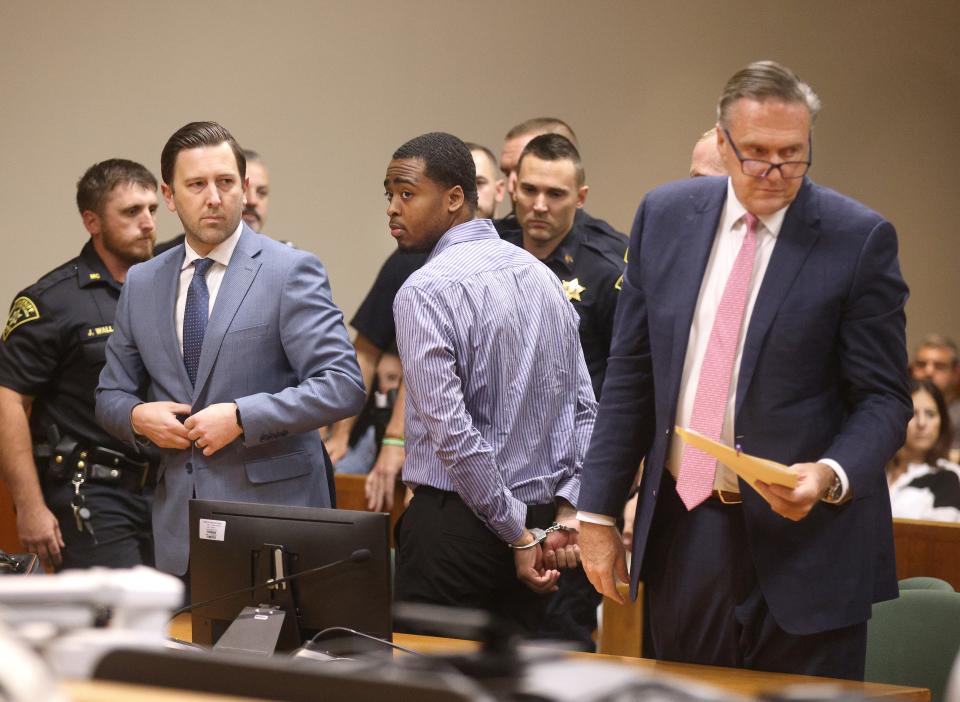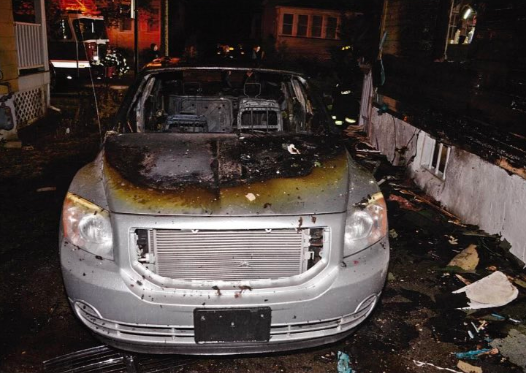Weed dealers in Rochester NY still leaving trail of death and destruction, 'gangs' or not
As progress of legalized marijuana remains wedged in New York's bureaucratic maw, the old-fashioned brand of marijuana — the illicit stuff — continues to flood the streets of Rochester.
There is money to be made with black-market marijuana: hundreds of thousands of dollars in fact. And an offspring of the trade is violence.
The equation is long entrenched: communities most in need of investment because of generations of poverty, redlining and economic deprivation become havens for drug-trafficking and its illegal profits, with a significant number of the drug buyers coming from surrounding suburbs.
Meanwhile, these Black and brown neighborhoods pay the highest price with the associated bloodshed and persistent trauma.
That harm has come in many forms, including bloodshed.
One example was laid bare in a recent trial detailing how during three nights of July 2022 three men were murdered and feuding factions vied to ambush each other with gunfire.
For the community of several blocks east of North Clinton Avenue, chaos and fear ensued.

Fatally shot were Rochester police officer Anthony Mazurkiewicz, hip-hop artist Richard Collinge and MyJel Rand. Convicted of their murder was Kelvin Vickers Jr., and his month-long trial still leaves some questions unanswered, both for neighborhoods and law enforcement:
Are the criminal gang factions in Rochester hierarchical organized structures as present in some major cities?
What is the reach of the factions? Vickers came to Rochester from Boston to provide muscle to one of the warring drug rings — was this simply through loose connections or the power of the ring?
Why did police send plainclothes officers in a 20-year-old Dodge van used so often that it was allegedly recognized in the neighborhood?
Why were a number of cops detailed to find a car linked to the violence without being alerted to the continuing escalation of gun battles?
Meanwhile the community is grappling with the wreckage from the trade in illegal marijuana and its aftermaths.
Trying to rupture the drug rings dealing East Coast weed
Two drug rings in Rochester — ostensibly supported by the Crips and the Bloods — are involved in major ongoing federal criminal cases. The Vickers' trial, court papers from the Vickers' case, and hearings and hundreds of pages from the federal cases provide a portal into the reach of the trafficking and the criminal investigations trying to rupture them.
The records also show the stubborn constancy of the trafficking.
Within months after the July 2022 killings, an alleged ringleader, Rasheem Sullivan, had drug houses back up and operating at full speed, according to allegations in court records. In October and November 2022, wiretaps intercepted calls from men allegedly associated with Sullivan.
In most calls, the banter about what prosecutors say are drug transactions is veiled and coded — but not in all of the calls.
"I just got done fixin' all those bags and about to bring them over again," one man says in a conversation, angering the other who apparently becomes worried about the blatant talk of packaged "bags."
"Man, you wilding on my phone," he responds. "I'm about to block your a--."
Drug-related violence in Rochester
Occasionally during the recent trial, witnesses testified about the drug-related skirmishes. Defense lawyers often elicited the testimony, perhaps trying to show that the violence was so pervasive that any attempts to try to link murders to one individual were futile.
"The violence was so rampant that people were just shooting each other up left and right," said defense attorney Michael Schiano.

Vickers was also convicted of the July 20, 2022, shooting murders of rapper Collinge and Rand on North Clinton Avenue. Also accused in those murders are Deadrick Fulwiley and Raheim Robinson, who are scheduled to be tried next year.
Fulwiley is also accused in federal court of marijuana trafficking and violence with an automatic weapon, defined as "machine gun" in federal law. Photos from a security camera at a house on Sixth Street, one allegedly used as a drug stash and purchase location, show Fulwiley entering with a black duffel bag.
A later search of the house revealed that the duffel bag held "multiple firearms," records say.
Accompanying Fulwiley was Brandon Washington, alleged to be the boss of the faction at war with Sullivan.
On July 21, hours before the murder of Officer Mazurkiewicz, police responded to reports of gunfire at the same Sixth Street house. There, records show, they found "what appeared to be numerous bullet strikes into the residence."
There were also indications of attempts to torch the house. Police found Budweiser bottles near the house "containing flammable liquids, with cloths inserted in the tops like Molotov cocktails."
Federal prosecutors allege that Washington has identified himself as a member of the violent gang, the "Crips." Sullivan has been alleged to be a member of the "Bloods," the gang known as rivals of the Crips.
Washington allegedly reached out to fellow gang members, including Vickers, from other cities for help.
Cpt. Umbrino on Gangs in Rochester: “In Rochester we have a bunch of kids that hang out together. Quite frankly, they’re not smart enough to be involved in an organized type of gang such as some of the historical ones that we’re familiar with.” pic.twitter.com/qBtAJJgag3
— Jackie Napier (@TheJackieNapier) July 22, 2023
The local debate over what is and isn't a "gang" may miss a larger point: Regardless of whether there is organization or simply a fluid and fluctuating rotation of individuals, violence is typically a byproduct that plagues neighborhoods.
"These group dynamics, whether they're a longstanding group or a group that’s just together for a few months has real consequences in term of violence, especially in micro-areas," said Irshad Altheimer, a Rochester Institute of Technology criminal justice professor who works with the city to analyze shootings.
In court last year, Washington's attorney said he was involved in drug trafficking but was no ringleader. "The role that Mr. Washington played was greatly exaggerated," lawyer Jessica Naclerio said.
Much of the evidence against Washington comes from videos taken from security cameras inside and outside his home. The videos, which show him armed and counting cash and marijuana, were of crystal-clear quality.
Arson as a weapon: Gang turf war in NY
Arsons and attempted arsons were part of the criminal playbook between the rival factions, according to prosecutors.
A silver Dodge Caliber, linked to the violence, was torched July 20 in the Weyl Street driveway of Sullivan's mother. Flames fully engulfed the car and stretched to the home.

The violent three-day span in July was rife with shootings as the feuding intensified.
The first witness at the trial was a North Clinton Avenue resident who, while blowing leaves from his lawn, had to duck behind his parked truck to avoid a swath of gunfire near his home.
Mazurkiewicz and Officer Sino Seng were part of the police tactical unit detailed to respond to the growing violence and to search out a car connected with the conflict.
District Attorney Sandra Doorley contended during the trial that Vickers likely knew the two men in the undercover van were police. Vickers was unknown to local police, and was willing to take on any task from the drug ring, prosecutors maintained.
"Who better to take care of that problem than a guy with no footprint in Rochester?" Doorley said in her closing argument. "They figured he could leave as quickly as he arrived."
The jury accepted the argument and found Vickers guilty of "aggravated murder" of a police officer, a charge that brings a life without parole sentence.
There have been no allegations connecting Brandon Washington directly to the murders, but instead the charges that his ongoing conflict with the Rasheem Sullivan-led faction was at the root of the killings.
Making money selling drugs in western New York
In the aftermath of the July 2022 violence, police searched multiple houses and apartments allegedly linked to the drug rings. Seized were nearly 140 pounds of marijuana and more than two dozen guns.
But the heavy police attention and the massive seizures could only be so much of an impediment.
Six months later, police raided the apartment of a man alleged to be an associate of Brandon Washington.
Found during the 6 a.m. raid in January were:
money counters
a rose-gold Rolex Oyster Perpetual Watch
$5,000 in a safe in a laundry room
$190 on a nightstand
nearly $263,000 inside kitchen cabinets and drawers. The bulk of the $263,000 consisted of $20 bills — 8,612 of them.
The seizure is now in the administrative process of forfeiture. Federal prosecutors contend that the cash is the offshoot of Washington's illegal marijuana trade, and that the man, who has not been criminally charged, also dealt cocaine.
In September, his lawyer filed papers demanding return of what was seized. He wants the money back. His contention: All of the money was legally obtained.
— Reporter Kayla Canne contributed to this article.
— Gary Craig is a veteran reporter with the Democrat and Chronicle, covering courts and crime and more. You can reach Craig at gcraig@rocheste.gannett.com. He is the author of two books, including "Seven Million: A Cop, a Priest, a Soldier for the IRA, and the Still-Unsolved Rochester Brink's Heist."
BACKGROUND:
More than a week ago, a jury found Kelvin Vickers, 22, guilty of the three murders and the attempted murder of another police officer. The verdict was welcomed by the victims' families, law enforcement and many in the community, especially since the jury decided that Vickers was likely aware the two men he ambushed in an undercover van were police.
The verdict should ensure that, without a successful appeal, Vickers will be imprisoned for life.
This article originally appeared on Rochester Democrat and Chronicle: Kelvin Vickers' murders stem from marijuana trafficking in New York

